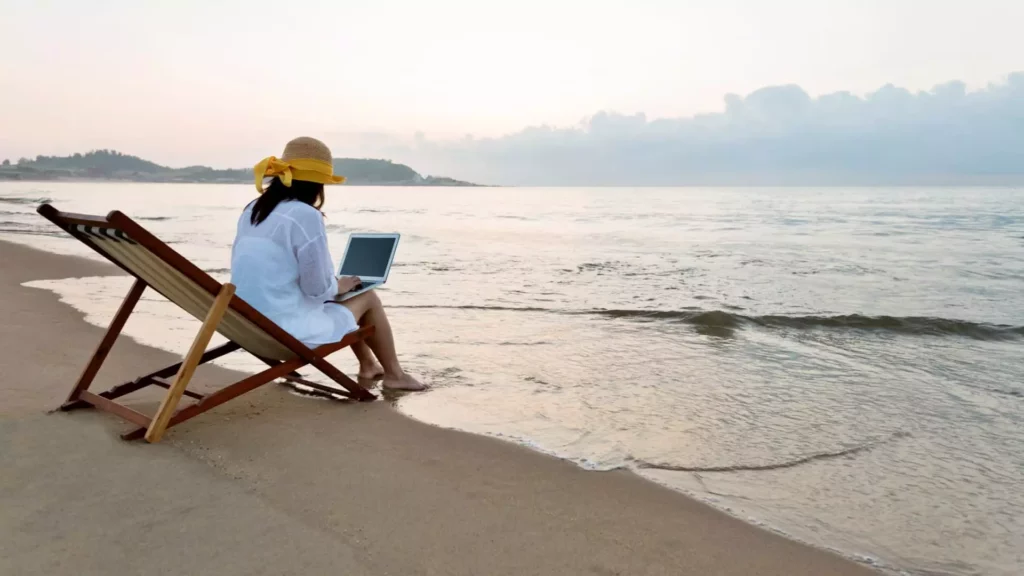The holiday season has always been synonymous with travel, family gatherings, and joyful reconnecting. However, in the wake of the COVID-19 pandemic, a new trend is shaping how Americans approach their vacation plans. The increasing acceptance of remote work is redefining the traditional travel experience, enabling a unique blend of work and leisure. Recent surveys reveal intriguing shifts in traveler behavior, suggesting that the trend of blending vacations with work is here to stay.
As structured office environments give way to more flexible work arrangements, many employees are seizing the opportunity to travel while maintaining their professional commitments. According to a Deloitte survey, approximately 49% of employed travelers identified as “laptop luggers” — individuals who plan to engage in work tasks during their holiday. This represents a significant surge from the previous year, where the number stood at 34%. The liberty to work remotely is not just a convenience but a transformative aspect of modern life, making it easier for families to combine personal time with professional obligations.
Crucially, this flexibility appears to resonate most strongly with younger generations and those in higher income brackets. Gen Z individuals, defined as those born between 1997 and 2012, and high earners demonstrate the highest affinity for laptop lugging, with participation rates of 58% and 52%, respectively. This trend indicates a shift in priorities, where work-life balance takes precedence over traditional notions of time off.
The pandemic reshaped the employment landscape, with job seekers increasingly viewing remote work as a critical condition for job acceptance. According to data from ZipRecruiter, the proportion of job seekers who prioritize the ability to work from anywhere has risen dramatically from 40.8% in early 2022 to 51% in the third quarter. This shifting tide highlights the increasing expectation for flexibility in the workplace, pushing employers to adapt in a competitive hiring environment.
Julia Pollak, chief economist at ZipRecruiter, remarks on the growing value of remote work, which has transformed into essential criteria for many workers. As companies strive to attract talent, the ability for employees to travel and work remotely presents a win-win situation — employees can enjoy more personal freedom, while organizations can retain skilled workers.
In addition to the desire for remote work, financial considerations remain a critical factor in holiday travel planning. A significant segment of travelers is opting for budget-friendly strategies, reflecting an urgent need to balance enjoyment with economic realities. About 83% of travelers are employing cost-saving measures, with many opting to drive instead of fly or reduce spending in other areas to accommodate travel expenses.
Insights from Morning Consult suggest that high-income consumers are leading the charge in holiday travel expenditures, with 52% of those earning over $100,000 indicating they can easily afford travel. Conversely, lower-income groups exhibit greater price sensitivity, a disparity that has implications for travel service providers and marketers targeting different demographics.
Millennials, who fall between 1980 and 1996, demonstrate yet another trend, signaling a willingness to spend more on travel during the holidays. On average, millennials plan to take around 2.6 trips, anticipating a spend of approximately $3,927. It becomes increasingly clear that while many are striving to save money, a significant portion is eager to invest in experiences that enhance life’s enjoyment.
Working Remotely: Cautions and Considerations
For those planning to mix work and pleasure, there are significant factors to consider. Employees are encouraged to carefully review company policies regarding remote work. Many organizations have explicit regulations regarding where employees can operate their duties; working from a vacation destination may contravene these policies. Thus, it’s paramount for employees to communicate with their supervisors to ensure their plans align with organizational expectations.
Furthermore, ensuring reliable internet access is crucial for seamless work operations while traveling. Before venturing off, individuals must identify locations equipped with the infrastructure necessary for productivity. Failing to secure a dependable setup could lead to frustration and unfulfilled job responsibilities.
The blended approach between work and leisure is proving to be a popular option for many travelers, driven by the newfound flexibility of remote work. These changes reflect broader shifts in societal values surrounding work-life balance and the importance of experiences over material possessions. As holiday travel continues to rise post-pandemic, navigating these trends will be essential for both travelers and service providers aiming to accommodate this evolving landscape.

